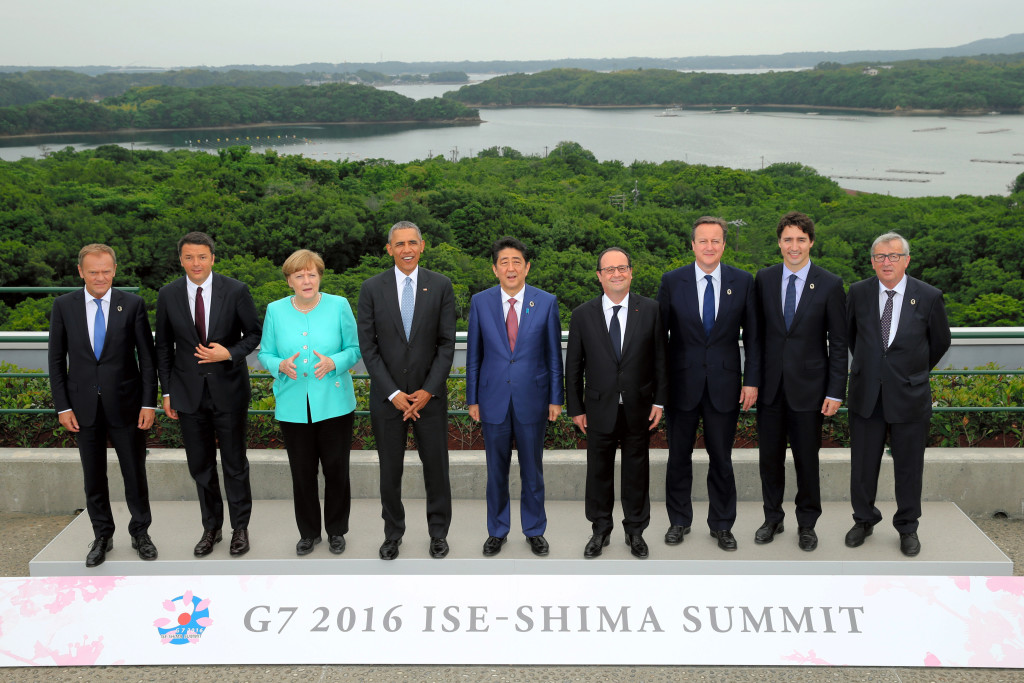Leaders of G7 nations to pay close attention on maritime disputes in Asia

Japanese Prime Minister Shinzo Abe, center, stands with other leaders of Group of Seven industrial nations, from left, European Council President Donald Tusk, Italian Prime Minister Matteo Renzi, German Chancellor Angela Merkel, U.S. President Barack Obama, Abe, French President Francois Hollande, British Prime Minister David Cameron, Canadian Prime Minister Justin Trudeau and European Commission President Jean-Claude Juncker as they pose for the family photo during the first day of the G-7 summit meetings in Shima, Japan, Thursday, May 26, 2016. (Japan Pool via AP)
ISE CITY, Japan — With a keen eye on the Philippines’ legal battle with China, leaders of the powerful Group of Seven (G7) nations have agreed to send a strong message on the importance of international law in resolving maritime disputes in Asia.
The world leaders said they should pay close attention to the pending Philippine case against China before a United Nations arbitration court, with some of them opining they should “raise their voice on this,” if necessary.
On the first day of the two-day G7 Ise-Shima Summit, the seven heads of state arrived at a decision to send a bold signal emphasizing international law in disputes in the South and East China seas, a Japan spokesperson said.
“On the expected judgment by the [UN] court of the issue of the oceans, G7 should pay keen attention on this, and, if necessary, will their raise voice on this,” said Yasuhisa Kawamura, press secretary of Japan’s Ministry of Foreign Affairs (Mofa).
At a briefing late Thursday, Kawamura relayed to the press the outcome of the closed-door session among the world leaders who had gathered for their annual meeting at the Shima Kanko Hotel nestled in the picturesque Ise-Shima region.
“They agreed on the importance of observance of international law, rule and principle. This point should be sent out as a clear signal to the rest of the world. That is G7’s expected role,” Kawamura said.
The MOFA official said the G7 leaders also recognized concerns about the people’s freedom of navigation and overflight, which, he added, were personally important to the heads of state.
Asked to elaborate on what conditions would necessitate raising the G7 bloc’s voice, Kawamura clarified these words were only a “comment” by the participants, and were not a wrap-up conclusion.
Formed in 1975 and representing the most industrialized democracies, G7 groups together the United States, Japan, Britain, Germany, France, Italy, Canada and the European Union.
Though not a member, China, the second largest economy, still cast a shadow over the talks with its increasingly aggressive posture in the East and South China seas.
In 2013, Manila initiated arbitration proceedings against Beijing before the United Nations Permanent Court of Arbitration after China refused to withdraw its ships from the disputed Panatag Shoal, internationally called Scarborough Shoal.
A ruling by the UN tribunal is expected later this year, even though China has refused to participate in the proceeding after accusing the Philippines of “political provocation” in seeking international arbitration.
The Philippines and China are embroiled in an ownership dispute over the Spratly islands, a reputedly resource-rich chain of isles and atolls claimed by four other regional neighbors.
Japan and the United States, whose leader President Barack Obama is present at the meeting, have long expressed support for the Philippine decision to pursue a case against China but both are careful not to comment on its legal merits.
Pressed to answer yes or no to a question on whether G7 would take a leadership role in the maritime disputes involving China, Kawamura said the issue was not so black and white.
“Diplomacy is sometimes not a yes or no type of interactions,” he said.
“Let me put it this way: They (G7 leaders) recognized the concerns, and they recognized the necessity to address it, and they agreed to a principled approach to the issues on the oceans,” he said.
Kawamura cited another comment by the world leaders that G7 might need to cooperate with Asean member-states, and possibly bring up the issue at the upcoming East Asia Summit in September. TVJ
For comprehensive coverage, in-depth analysis, visit our special page for West Philippine Sea updates. Stay informed with articles, videos, and expert opinions.